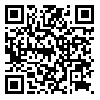1. Borjian M, Joghataei B. Standard haye monaseb sazi bana ha va mohit haye shahri baraye afrad daraye malooliyat [Standards for suitable buildings and urban environments for people with disabilities]. Tehran: State Welfare Organization Pub; 2009. [Persian]
2. Neal J, Biberman J. Research that matters: helping organizations integrate spiritual values and practices. Journal of Organizational Change Management. 2004;17(1):7–10. [
DOI]
3. Purnamasari P, Amaliah I. Fraud prevention: relevance to religiosity and spirituality in the workplace. Procedia-Social and Behavioral Sciences. 2015;211:827–35. [
DOI]
4. Milliman J, Gatling A, Kim J (Sunny). The effect of workplace spirituality on hospitality employee engagement, intention to stay, and service delivery. Journal of Hospitality and Tourism Management. 2018;35:56–65. [
DOI]
5. Mirzaei Tavakoli M, Shariatmadari M. The effect of spirituality at workplace and organizational commitment on job satisfaction of the staff of the supreme leader's representative office at universities. Management in Islamic University. 2015;4(9):59–76. [Persian] [
Article]
6. Nasr Esfahani A, Amiri Z, Farokhi M, Seyfi M. The effect of the spirituality in the workplace on the social undermining with mediating role of organizational ethical climate (department social security of Isfahan as a case study). Applied Sociology. 2017;28 (2):17–37. [Persian] [
Article]
7. Kumar V, Kumar S. Workplace spirituality as a moderator in relation between stress and health: an exploratory empirical assessment. Int Rev Psychiatry. 2014;26(3):344–51. [
DOI]
8. Nasina MD, Doris KPP. The workplace spirituality and affective commitment among auditors in big four public accounting firms: does it matters? Journal of Global Management, 2011;2(2):216–26.
9. Kannan R, Pillai MP. An examination on the professional commitment of engineering college teachers. International Business Management. 2008;2:218–24.
10. Faraji R, Bashiri M, Yavari Y, Ebrahimi Konglou H. Predicting Job performance through employee's personality traits and occupational commitment: a study of east Azarbaijan youth and sport offices' staffs. Journal of Human Resource Management in Sport. 2016;3(2):187–204. [Persian]
11. Smith D, Hall M. An empirical examination of a three-component model of professional commitment among public accountants. Behavioral Research in Accounting. 2008;20(1):75–92. [
DOI]
12. Mitchell R, Boyle B, Von Stieglitz S. Professional commitment and team effectiveness: a moderated mediation investigation of cognitive diversity and task conflict. J Bus Psychol. 2019;34(4):471–83. [
DOI]
13. Molanorouzi S, Arbabi H, Rezaei Z. The relationship between psychological empowerment and organizational citizenship behavior of physical education teachers in Golestan province: the mediating role of job satisfaction. Organizational Behavior Management in Sport Studies. 2017;4(2):77–88. [Persian] [
Article]
14. Singh M, Sarkar A. Role of psychological empowerment in the relationship between structural empowerment and innovative behavior. Management Research Review. 2019;42(4):521–38. [
DOI]
15. Guadagnoli E, Velicer WF. Relation of sample size to the stability of component patterns. Psychol Bull. 1988;103(2):265–75. [
DOI]
16. Milliman J, Czaplewski AJ, Ferguson J. Workplace spirituality and employee work attitudes: An exploratory empirical assessment. Journal of Org Change Mgmt. 2003;16(4):426–47. [
DOI]
17. Hemmati Noudoost Guilani M. Hasanzadeh MS, Monzavi F. Investigating the relationship between workplace spirituality and organization-based self-esteem. Organizational Behavior Studies. 2015;4(1):51–74. [Persian] [
Article]
18. Meyer JP, Becker TE, Vandenberghe C. Employee commitment and motivation: a conceptual analysis and integrative model. J Appl Psychol. 2004;89(6):991–1007. [
DOI]
19. Faraji R, Bashiri M, Yavari Y, Ebrahimi Kanglou H. Predicting Job Performance through Employee's Personality Traits and Occupational Commitment: A Study of East Azarbaijan Youth and Sport Offices' Staffs. Journal of Human Resource Management in Sport.2016;3(2):187-204. [
DOI]
20. Spreitzer GM. Psychological empowerment in the workplace: dimensions, measurement, and validation. Acad Manag Journal. 1995;38(5):1442–65. [
DOI]
21. Teymournejad K, Sarihi Asfestani R. Effects of organizational learning on psychological empowerment, in the ministry of economic affairs and finance. Management Studies in Development and Evolution. 2010;20(62):37–59. [Persian] [
Article]
22. Darafash H, Golshanpour M. The relationship between spirituality in workplace with organizational health and principals organizational commitment of the high schools of Ahvaz. School Administration. 2018;6(2):123–42. [Persian] [
Article]
23. Kabiri A, Ghaleei A, Talebi M, Sheykhlou M. Relationship between dimensions of spirituality (as ethics) in the workplace with organizational health and organizational trust. Ethics in Science and Technology. 2019;14(2):83–91. [Persian] [
Article]
24. Seif MH, Rastegar A, Akbari E, Tajvaran M. A model for predicting attitude of desire to change based on components of spirituality in the workplace and organizational commitment in the oil pipelines and telecommunications company of Fars district. Strategic Studies in The Oil and Energy Industry. 2019;10(39):127–48. [Persian] [
Article]
25. Movahhed A, Abbasi Z. The role of psychological empowerment in the prediction of psychological well - being in health care workers ran. Healthcare Management. 2019;10(1):53–65. [Persian] [
Article]
26. Gharibzadeh R, Alizadeh S. Modeling the relationship between spirituality in the workplace and job excitement with the role of mediating psychological empowerment. Rooyesh. 2018;7(7):299–320. [Persian] [
Article]
27. Petchsawang P, Duchon D. Workplace spirituality, meditation, and work performance. Journal of Management, Spirituality & Religion. 2012;9(2):189–208. [
DOI]

 ، یعقوب بدری آذرین*2
، یعقوب بدری آذرین*2 
 ، مظفر یکتایار3
، مظفر یکتایار3 
 ، مژگان خدامرادپور3
، مژگان خدامرادپور3 




